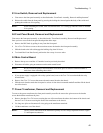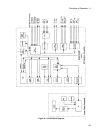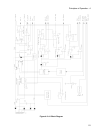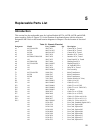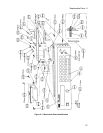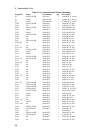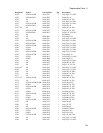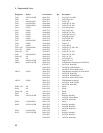Principles of Operation - 4
53
The output is programmed off.
An overvoltage condition is detected (OV_Detect* signal is received).
The line voltage falls below 90 volts (approximately).
Current readback is provided by three separate circuits. The previously discussed high range current signal (Imon_H)
returns the high range current measurement. When the unit is operating in the low current readback mode, a separate
low range current shunt and amplifier provides low-current readback via the Imon_L signal. The Range_Select signal
drives shunt clamps Q304 and Q305, which clamp the voltage across RmLo to approximately 1.8 V. A third current
readback circuit is available on the Agilent 66332A unit. It consists of a high bandwidth current amplifier that
returns dynamic current measurements from the output filter capacitor via the Imon_P signal. Note that the Imon_H
and the Imon_P signal are combined to return the actual output current measurement.
An overvoltage detect circuit compares the output voltage to the programmed overvoltage setting. When the output
exceeds the programmed setting, the OV_Detect* signal goes low, which informs the logic array that an OV
condition has occurred. The crowbar control circuit is enabled when the OV_SCR* signal is received. When an
overvoltage condition occurs, the SCR control circuit generates the OV signal, which causes the following actions to
occur:
1. The SCR fires, shorting the supply's output.
2. The microprocessor circuits are notified of the OV condition (OV_Detect* is low) in order to program the
output off, turn off the gain stage bias, and update the status of the unit.
3. When a output protection clear command is executed, the microprocessor circuits resets the OV circuits,
turns on the gain stage bias, and programs the output to its previous level.
The fan driver control circuit provides the DC voltage to operate the cooling fan. The Fan_Prog signal from the
secondary interface circuit varies this voltage according to the ambient and heatsink temperature as well as the output
voltage and current of the supply.



